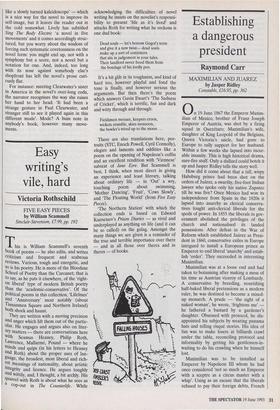Easy writing's vile, hard
Victoria Rothschild
FIVE EASY PIECES by William Scammell Sinclair-Stevenson, £7.99, pp. 192 This is William Scammell's seventh book of poems — he also edits, and writes criticism and frequent and scabrous reviews. Various, tough and energetic, and so is his poetry. He is more of the Bloodaxe School of Poetry than the Carcanet; that is to say, as he puts it elsewhere, of the 'right- on liberal' type of modern British poetry than the 'academic-conservative'. Of the political poems in this collection, 'Lifelines' and 'Anniversary' most notably (about Tiananmen Square and Northern Ireland) both shock and haunt.
They are written with a moving precision and anger which lift them out of the partic- ular. He engages and argues also on liter- ary matters — there are conversations here With Seamus Heaney, Philip Roth, Lawrence, Mallarme, Pound — where he minds and quips (in his letters to Heaney and Roth) about the proper uses of lan- guage, the broadest, most liberal and rich- est meanings of nationality, about artistic integrity and licence. He argues toughly and wittily, and, I thought, a bit archly. His quarrel with Roth is about what he sees as a cop-out in The Counterlife. While acknowledging the difficulties of novel writing he insists on the novelist's responsi- bility to present 'life as it's lived' and attacks Roth for writing what he reckons is one dud book: Dead souls — let's borrow Gogol's term and give it a new twist— dead souls make up a sort of comintem that sits in judgement in your tales. Their landlord never freed them from the bondage of his lordly pen.
It's a bit glib in its toughness, and kind of hard too, however playful and fond the tone is finally, and however serious the arguments. But then there's the poem which answers Gavin Ewart's 'The Sadness of Cricket', which is terrific, fun and dark and witty through and through:
Fieldsmen menace, keepers croon, wickets crumble, skies monsoon, the bowler's wired up to the moon . . .
There are also translations here, por- traits (STC, Enoch Powell, Cyril Connolly), elegies and laments and oddities like a poem on the opening of Napoleon's coffin and an excellent rendition with 'Viennese' subtext of Jane Eyre. But Scammell is best, I think, when most direct in giving an experience and least literary, talking about ordinary life — in 'Out' a wry, touching poem about swimming, `Mother Dancing', 'Fruit', 'Cows Slowly', and 'The Floating World' (from Five Easy Pieces). The Northern Station' with which the collection ends is based on Edward Kuznetsov's Prison Diaries — as vivid and underplayed as anything on life (and it can be so called) on the gulag. Amongst the many things we are given is a reminder of the true and terrible importance over there — and in all those over theres and in theres — of books.


















































 Previous page
Previous page